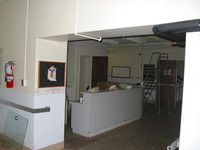 |
Interior of the Madison County Nursing Home in 2002 After Mine Subsidence |
This photograph shows the interior of the Madison County Nursing Home in 2002. The nursing home closed in the late 1990s. The building was torn down a few years after the photo was taken. |
December 20, 2002 |
August 13, 2018 |
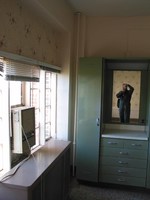 |
Interior of the Madison County Nursing Home in 2002 After Mine Subsidence |
This photograph shows the interior of the Madison County Nursing Home in 2002. The nursing home closed in the late 1990s. The building was torn down a few years after the photo was taken. |
December 20, 2002 |
August 13, 2018 |
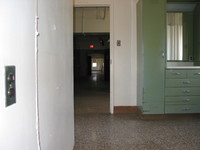 |
Interior of the Madison County Nursing Home in 2002 After Mine Subsidence |
This photograph shows the interior of the Madison County Nursing Home in 2002. The nursing home closed in the late 1990s. The building was torn down a few years after the photo was taken. |
December 20, 2002 |
August 13, 2018 |
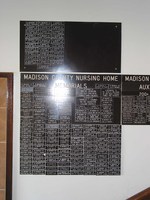 |
Memorials in the Madison County Nursing Home in 2002 after Mine Subsidence |
This photograph shows memorials in the Madison County Nursing Home in 2002. They are dedicated to the memory of numerous individuals, presumably late residents of the nursing home. The building was torn down a few years after the photo was taken. |
December 20, 2002 |
August 13, 2018 |
 |
2002 the Interior of the Madison County Nursing Home in 2002 After Mine Subsidence |
Interior photograph of the Madison County Nursing Home in 2002 after it was closed in the 90s. |
December 20, 2002 |
October 11, 2017 |
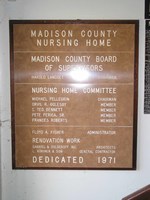 |
Plaque inside the Madison County Nursing Home in 2002 after Mine Subsidence |
This photograph highlights the local dignitaries of Madison County who were presently in office at the time of the 1971 dedication of the Madison County Nursing Home |
December 20, 2002 |
October 11, 2017 |
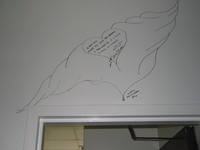 |
Graffiti in the Madison County Nursing Home in 2002 after Mine Subsidence |
This 2002 photograph shows graffiti written on the wall of the Madison County Nursing Home after it was closed in the late 90s. The graffiti reflects the sadness of the closure of the nursing home. |
December 20, 2002 |
October 11, 2017 |
 |
Graffiti in the Madison County Nursing Home in 2002 after Mine Subsidence |
This 2002 photograph shows graffiti written on the wall of the Madison County Nursing Home after it was closed in the late 90s. The graffiti expresses the thoughts and feelings of those who worked, as well as their sadness upon its closure. |
December 20, 2002 |
October 11, 2017 |
 |
Graffiti in the Madison County Nursing Home in 2002 after Mine Subsidence |
This 2002 photograph shows graffiti written on the walls of the Madison County Nursing Home after it was closed in the late 90s. The graffiti reflects the well wishes of the staff to the residents |
December 20, 2002 |
October 11, 2017 |
 |
Graffiti in the Madison County Nursing Home in 2002 after Mine Subsidence |
This 2002 photograph shows graffiti written on the wall of the Madison County Nursing Home after it was closed in the late 90s. The graffiti reflects the sadness of the closure of the nursing home. |
December 20, 2002 |
October 11, 2017 |










